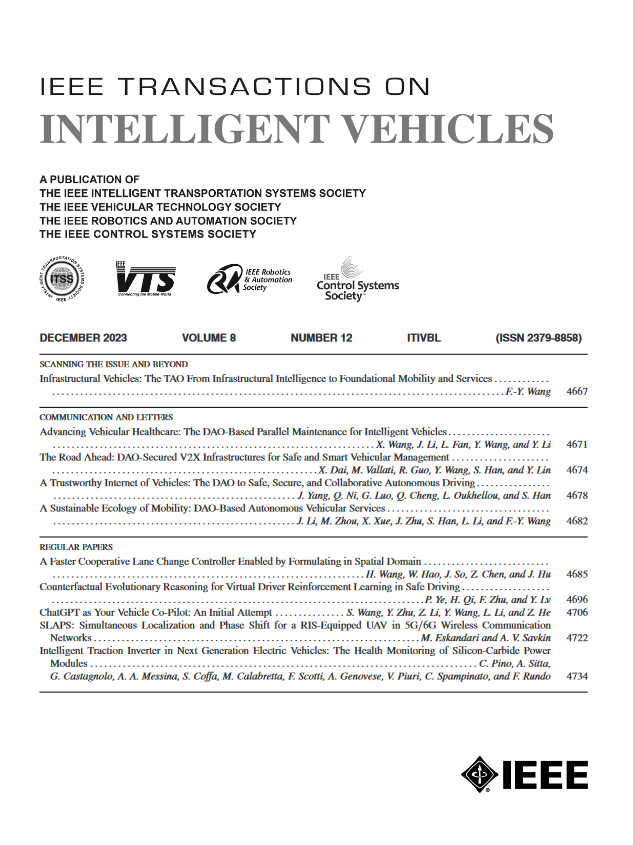Sora for Senarios Engineering of Intelligent Vehicles: V&V, C&C, and Beyonds
IF 14
1区 工程技术
Q1 COMPUTER SCIENCE, ARTIFICIAL INTELLIGENCE
引用次数: 0
Abstract
The advent of Scenarios Engineering (SE) paves the way to a new era of intelligent vehicles (IVs), driven by Artificial Intelligence (AI)-enabled strategies. It aims at shaping the IVs to be a form that is more relevant to the underlying scenario, thereby accomplishing validation, verification (V&V), and calibration, certification (C&C) of each vehicle. However, such improved capabilities relies on the accumulation and analysis of an unprecedented volume of scenarios. Recently, Sora and other video generation models have opened up new horizons for Imaginative Intelligence. As an extension of TIV-DHW (Distributed/Decentralized Hybrid Workshop) on SE, this letter discusses the potential of Sora to change the scenario generation process by reducing physical shooting, increasing extreme scenario generation, thereby enabling more comprehensive training and testing of IVs. This letter also analyzes the limitations of Sora in accurately model physics and understand cause and effect, which may affect its effectiveness in SE applications. Last, through a comprehensive outlook, this letter aims to provide a potential direction for the development of Sora-like AI technology, thereby promoting the safety, efficiency, reliability, and sustainability of IVs.Sora for Senarios Engineering of Intelligent Vehicles:V&V、C&C 和 Beyonds
场景工程(SE)的出现为人工智能(AI)战略驱动的智能车辆(IV)新时代铺平了道路。其目的是将智能车辆(IVs)塑造成与基础场景更加相关的形式,从而完成每辆车的验证、核查(V&V)以及校准和认证(C&C)。然而,这种能力的提高有赖于前所未有的大量场景的积累和分析。最近,索拉和其他视频生成模型为想象智能开辟了新天地。作为 TIV-DHW(分布式/分散式混合研讨会)在 SE 上的延伸,这封信讨论了 Sora 通过减少物理拍摄、增加极端场景生成来改变场景生成过程的潜力,从而实现更全面的 IV 培训和测试。本信还分析了 Sora 在准确建立物理模型和理解因果关系方面的局限性,这些局限性可能会影响其在 SE 应用中的有效性。最后,这封信通过全面的展望,旨在为类似 Sora 的人工智能技术的发展提供一个潜在的方向,从而促进 IV 的安全性、效率、可靠性和可持续性。
本文章由计算机程序翻译,如有差异,请以英文原文为准。
求助全文
约1分钟内获得全文
求助全文
来源期刊

IEEE Transactions on Intelligent Vehicles
Mathematics-Control and Optimization
CiteScore
12.10
自引率
13.40%
发文量
177
期刊介绍:
The IEEE Transactions on Intelligent Vehicles (T-IV) is a premier platform for publishing peer-reviewed articles that present innovative research concepts, application results, significant theoretical findings, and application case studies in the field of intelligent vehicles. With a particular emphasis on automated vehicles within roadway environments, T-IV aims to raise awareness of pressing research and application challenges.
Our focus is on providing critical information to the intelligent vehicle community, serving as a dissemination vehicle for IEEE ITS Society members and others interested in learning about the state-of-the-art developments and progress in research and applications related to intelligent vehicles. Join us in advancing knowledge and innovation in this dynamic field.
 求助内容:
求助内容: 应助结果提醒方式:
应助结果提醒方式:


